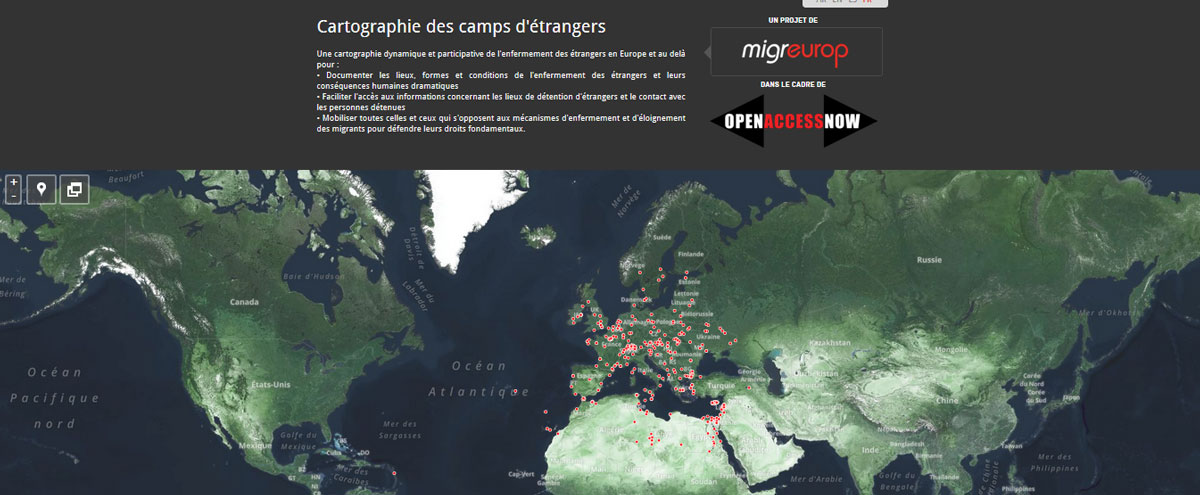Migreurop
Dynamic Map of Foreign Citizens Detained at State Borders
Cartography, 2013
The map of detention facilities in Europe and the Mediterranean countries produced by Migreurop is the basis of the project of establishing a dynamic mapping of the detention of foreigners . The aim is to describe these geographical entities with their corollaries attributes, taking into account the temporal dimension (1980 – 2012) which is an important factor in understanding the evolution of the confinement of migrants which operates within the European Union and beyond its borders into neighbouring countries. As in any geographic information system, the development of a database aims to better identify, describe and locate places of confinement. The idea is to present a dynamic mapping and analysis of contemporary camps at different scales, arriving to the production of a regional or European map through the development of intermediate strata. The project also aims to provide practical tools to both prisoners and families or friends wishing to contact their relatives.
Every day, in the European Union (EU) and the countries with which the EU has close partnerships, children, women and men are arrested and detained in places where the period of administrative detention may last for a few hours to several months or even years. Their “crime” is that they have no regular residence permits or travel documents. In the last twenty years, authorities in these countries are increasingly defining the mere act of crossing of borders by foreigners without such documents and their status of being “undocumented” as criminal.
Migreurop opposes these policies of confinement as their consequences.
Thus, on the occasion of the exhibition of the antiAtlas of borders, the network has set up a “closethecamps.org” website that stores and makes public information related to this type of detention centres where people are imprisoned, sometimes without trial. Places of detention that appear on the “closethecamps.org ” website were operational in 2013, or 2011 and/or 2012 (If there has been no information about possible closure of such centres for the past two years, they are included on the website.).
This project is interactive : as visitors you will be able to discover these places, some of which may be right next to you, and have the possibility of bringing additional information (see the page “Contribute!” on the site). Besides the internet, there is a telephone for those who want to call a centre to hear the testimony of detainees, or try to understand what is happening inside the “border”. By clicking on the “closethecamps.org” website, you will find the French camps listed below, as well as the numbers of phone booths located inside these places :
– Bordeaux
– Coquelles
– Hendaye
– Lille 2
– Lyon
– Marseille (Canet)
– Mesnil Amelot 2 et 3
– Metz Queuleu
– Nice
– Nîmes
– Palaiseau
– Paris Dépôt
– Paris-Vincennes
– Perpignan
– Plaisir
– Rennes
– Rouen
– Sète
– Strasbourg
– Toulouse-Cornebarrieu
You are invited to phone only to the booths and not to NGOs working within these centers so as not to disturb their work .
Telephone conversations you have with detainees must take place in a respectful environment. Please also be careful not to feed false hopes (particularly in relation to their administrative status) nor to add to the plight of people with whom you come in contact .
“La Compagnie” reserves the right to remove the telephone for a temporary period.
This work results from the cooperation between: Lydie Arbogast (Migreurop), Alessandra Capodanno (Migreurop), Olivier Clochard (Migrinter, University de Poitiers / Migreurop), Agathe Etienne(Migreurop), Thomas Honoré (Pôle Carto, Incittà, Marseille), David Lagarde (Lisst, University de Toulouse 2 / Migreurop),Nicolas Lambert (Riate, University Paris 7 Denis Diderot / Migreurop), Nicolas Pernet (Cimade), Laurence Pillant(Telemme, University Aix-Marseille) Louise Tassin (Urmis, University Paris 7 Denis Diderot / Migreurop), Ronan Ysebaert (Riate, University Paris 7 Denis Diderot). These authors have already been working together since 2011, in the context of the Atlas of migrants in Europe, Critical Geography of Migration Policies (published by Armand Colin in November 2012, p. 144) and on the mapping of migrant detention camps.
